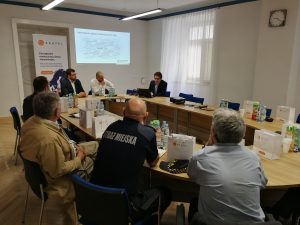What residential and municipal problems can Smart City technology solve? How to implement the technology for it to primarily answer the actual needs of Przemyśl? How to plan city development in the long term? These and other questions will be answered by the participants of workshops organized by EXATEL for the City Hall in Przemyśl.
The first of two planned events, held on 19 and 20 April, is an element of an audit commissioned by the city authorities. It is supposed to provide recommendations on the scope and method of Smart City solution implementation in Przemyśl.
“Smart City is not only a trendy and catchy slogan. Introducing solutions hidden under this term is a necessity for Polish cities, and the residents of Przemyśl deserve technologies that will satisfy their expectations and demands associated with increasing the safety and comfort of their lives. The solutions we are planning to implement, which are unique on a national scale, will also support and facilitate the everyday operations of municipal units” – Robert Choma, President of Przemyśl.
Smart City – a city supporting its residents
What is Smart City? It is a city that provides interactive communication with its citizens. This happens with the help of numerous sensors that collect information on the surrounding urban space and help the people in their daily life. Embodiments of Smart City technology are air quality sensors, dusk-activated lighting, smart cameras notifying dispatchers about hazards or intersection lighting adapting to traffic intensity. In other words – it is a city actively supporting its inhabitants.
“The on-going audit is to help us diagnose and determine specific issues and needs of Przemyśl and its citizens – because there is no single, universal formula that can be applied in every city. Only the results of such an analysis will enable thorough planning of investment. I am glad that EXATEL has offered us a very partnership-based form of cooperation through dialogue with the employees of our units. Looking at the situation from an outsider’s perspective, while utilizing the knowledge of the people who solve the issues concerning Przemyśl on a daily basis will certainly bring good results” – Robert Choma, President of Przemyśl
Implementing Smart City in a city as topographically diverse as Przemyśl is a big challenge. This is why we have to know which tasks have priority, and what city authorities and citizens care about the most? Only then will we be able to develop specific recommendations in terms of constructing smart Przemyśl – Rafał Magryś, EXATEL Vice-President.
Studying the needs is the most important thing
The scope of Smart City in Przemyśl will be presented during the first of two workshops. The representatives of such units as the City Hall, Municipal Transport Company, Sport and Recreation Centre in Przemyśl, Municipal Police, Municipal Road Authority and companies dealing with municipal management will jointly agree on the catalogue of city needs and work schedule. However, the key outcome will be a list of specific issues to be solved by Smart City in such fields as IT technologies, security, energy efficiency and transport.

“Implementing Smart City is a good example of the practical application of possibilities provided by new technologies. We know the drill – we deal with research and development on a daily basis. As a Polish company, we develop our own products and cooperate with domestic research centres, but we also work on the technologies of the future. A good example is our participation in the international project called RAPID 5G. In 2017, we organized the first 5G technology tests in a public space in Europe. These are solutions that will be a flywheel for the development of smart cities” – Rafał Magryś, EXATEL Vice-President.
Importantly, Smart City also assumes sharing the collected data so that it can be freely used for developing apps for the purposes of specific resident groups. For example, the city of Barcelona alone shared a total of several thousand open-source data sets.
The audit is planned for completion in May 2018. The report drawn up by EXATEL will contain guidelines on how to build a smart city most effectively – and of particular relevance, not only in terms of technology. An equally significant element will be suggestions on how to utilize the data acquired by sensors for the benefit of the local community.


